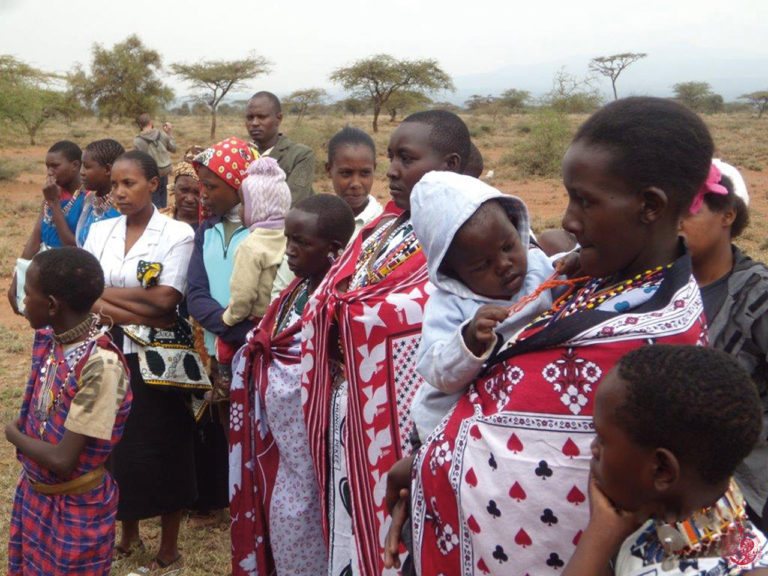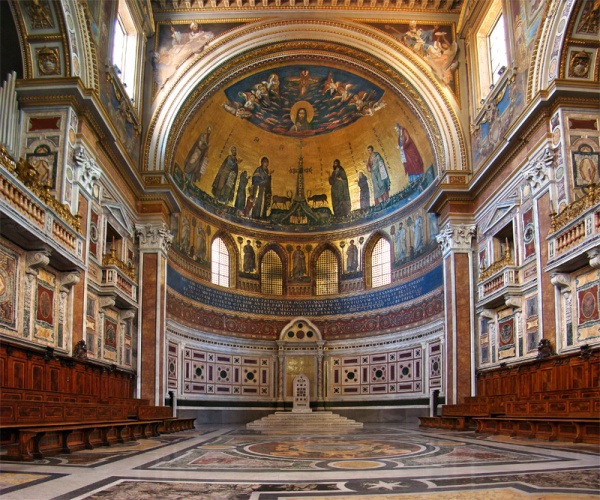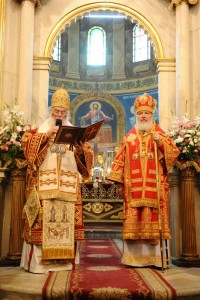By Orthodox Archbishop of Zimbabwe Seraphim
Orthodox Church in Zimbabwe
"During the times of Persecution of the Church, women proved to be true heroes of the Christian Faith. They were the silent and secret defenders of the Church. They proclaimed loudly the true faith in God confessing their faith in Christ before emperors, Kings rulers and Judges. It was women who guarded the churches and the Sacred Relics of our Faith. Putting their own lives in danger, they moved the Holy of Holies to safety, when under threat. They taught the Christians faith to their children, ever when it was dangerous to do so. This special strength which women have is the gift from Lord our God. It is a special grace granted to them by the Holy Spirit to enable them to preserve the faith."
Two Orthodox Turkana women (from here)
"What is the role of women, today, in our Orthodox Church".
First and foremost, women must accept Christ as their own Lord and Savior. Women who acknowledges Christ, through baptism, accept the mandate of Christ’s love. She partakes in the Liturgical Life of the church. Though Holy Communion our Lord enters the soul of a woman and she becomes part of Him. She is instructed to listen to Holy Scriptures and to apply their Teachings in her daily life. She must become the light of the world, enlightening those allowed her, through good example, in the Christian way of life. She devotes her self out of love, to the service of Christ in all aspects of her personal, family and community life. Most of all, she puts on her love for Christ through her fellow man, and brings to God all those within her own family.
Orthodox Women in the Feast of the Dormition of the Theotokos in Congo-Brazzaville (from here)
Her
first priority is to fulfil God’s Divine Within her own family, her
husband and her children. This then widens to the extended family: to
her neighbour, to her parish community and then to the whole world. A
Christian woman is today’s society, whether she works outside the home
or not, is instrumental in nurturing her children. Even if she is not
yet married, or has not chosen the way, a woman often serves in the
society in the capacity of helping others, as a teacher, as a nurse, as
doctor, as a wife, as a mother. As a wife, she cares for her husband and
her children. She brings a reality of church into her home and guides
her home to the church. Within her heart she understands the meaning.
Orthodox nuns in Uganta, sisters Mary, Thaboria & Theosemni (from the article The Orthodox Church in Uganda, an outgrowth of indigenous self discovery)
"The family which prays together, stays together ".
 An Orthodox Christian woman through faith, finds strength to that for
which the Lord has chosen her. She uses the Sacramental Life of the
church to strengthen her family’s faith in the Risen Lord and to
practice His Commandments. She understands the necessity for Christ to
be within her life, and within the life of her family and generally in
all the community, large and small. Life in Orthodox Church is not a
simple matter of just attending Sunday Services: and an Orthodox woman
is not just someone to prepare the coffee for those who have attended
the service. Orthodoxy is not wearing a big cross, nor making the
elegant gesture of the sign of the Holy Cross.
An Orthodox Christian woman through faith, finds strength to that for
which the Lord has chosen her. She uses the Sacramental Life of the
church to strengthen her family’s faith in the Risen Lord and to
practice His Commandments. She understands the necessity for Christ to
be within her life, and within the life of her family and generally in
all the community, large and small. Life in Orthodox Church is not a
simple matter of just attending Sunday Services: and an Orthodox woman
is not just someone to prepare the coffee for those who have attended
the service. Orthodoxy is not wearing a big cross, nor making the
elegant gesture of the sign of the Holy Cross.
St Catherine of Alexandria (the Great-Martyr & Wonderworker)
Orthodoxy is not raising money for some purpose in life.
These things may be an indicator of something; an act of love and piety,
but without Christ love and teachings, they remain fruitless. During
the times of Persecution of the Church, women proved to be true heroes
of the Christian Faith. They were the silent and secret defenders of the
Church. They proclaimed loudly the true faith in God confessing their
faith in Christ before emperors, Kings rulers and Judges. It was women
who guarded the churches and the Sacred Relics of our Faith. Putting
their own lives in danger, they moved the Holy of Holies to safety, when
under threat. They taught the Christians faith to their children, ever
when it was dangerous to do so. This special strength which women have
is the gift from Lord our God. It is a special grace granted to them by
the Holy Spirit to enable them to preserve the faith.
Christina Mothapo, the oldest, but also one of the most faithful members
of the Orthodox Church in Mamelodi, South Africa. See here.
My beloved children, As Your spiritual Father I call upon you all to be strong in your Orthodox faith. Study Orthodoxy deeply, so that you know,
teach and defend it all times. Fill yourselves with the knowledge of
our Orthodox faith based on Holy Scriptures and Holy Tradition. Learn
the Traditions of Orthodoxy, so that you may keep it unsoiled and
unfilled as many holy women in the past have preserved it, for those who
will follow. Fill yourselves with wisdom of God and practice Christ’s
teaching. Love him and show compassion towards your neighbour. You have
an important role in the Church, to pass down this Orthodox Faith to the
next generation and that which will follow.
The gift of faith which you hold, is different from those of others. An Orthodox woman has the gifts of cherishing and maintaining a special precious jewels; our Orthodox Faith. Her role is not simply to sweep floors or wash windows, or bake prosphora, but to keep the attitude and the idea of Orthodoxy alive in her family and within society. Even when there is an absence of interest for Orthodoxy, women hold aloft the Spirituality of Orthodoxy. Let the Lord God bless all women and continue to strengthen them in their faith and life let the Holy Theotokos protect and instruct all women to follow Her example in life. Let the Ever Virgin Mary be the protectress of our Orthodox Faith.
The gift of faith which you hold, is different from those of others. An Orthodox woman has the gifts of cherishing and maintaining a special precious jewels; our Orthodox Faith. Her role is not simply to sweep floors or wash windows, or bake prosphora, but to keep the attitude and the idea of Orthodoxy alive in her family and within society. Even when there is an absence of interest for Orthodoxy, women hold aloft the Spirituality of Orthodoxy. Let the Lord God bless all women and continue to strengthen them in their faith and life let the Holy Theotokos protect and instruct all women to follow Her example in life. Let the Ever Virgin Mary be the protectress of our Orthodox Faith.
 Maasai Women, Kenya (From here)
Maasai Women, Kenya (From here)
In recent times, there has been much discussion concerning the role and
place of women within society as well as the Church. Indeed a
significant amount of criticism has been leveled against Christians by
certain sectors of the Feminist movement, which claim that Christianity
represses rather than liberates women. In short, the same voices accuse
Christianity of being an agent of oppression and enslavement rather one
of liberation and honour for women. From a historical point of view
however, the opposite is the case. Let us briefly consider how
Christianity acts as a force of liberation, appreciation and empowerment
for women. Let us look at situation and circumstances of prior to the
coming of Christianity into the world and then appreciate how
revolutionary has been the historical impact of Christianity on the role
and status of women. Only then, when seen in its proper historical
context can one appreciate and understand how important Christianity has
been in elevating the status of women.
I will choose some examples from
pre-Christian history. Pre-Christian society, by and large, considered
women as an inferior being. In a sense she was an adequate human. It was
claimed that by their very nature women did cot possess moral courage
and endurance- two of the most respected virtues of ancient society.
Women were viewed as natural cowards. Indeed most branches of philosophy
went a step further and made that women did not possess the faculty of
logic- they were by nature irrational, unreasonable and illogical. In
short they too emotional! Consequently women, with rare exceptions did
not receive the advantage of education and were not received into
philosophical circles. Certainly they did not have any political power.
Roman society, which admired courage, considered women as lacking this
virtue. Consequently a women could not bring military strength.
Consequent as elsewhere in the ancient world women were regarded as
inferior humans.

Saint Monica of Hippo, st Augustine's mother (icon from here)
Early Jewish society ascribed to women a deceiving and evil nature. Thus
claims were made that woman were responsible for the fall of man.
Consequently she was considered a natural liar and an agent of the
devil. For that reason a woman was denied a right to testify in court
since her word could not be trusted. Within this historical context the
advent of Christianity proved to be a revolution for the cause and
understanding of women as intelligent, courageous and virtuous- in
effect Christianity empowered women in an unprecedented manner. Within
the pages of the Gospels the female followers of Jesus are often
described as courageous while the male disciples are depicted as
cowardly. For instance while St. Peter denied Christ out of fear, while
all other male disciples except St. John field during the crucifixion
several women stood at the feet of the cross without fear. Likewise when
men were locked indoors for fear of the Jews the women went out to
anoint the body of Jesus.
Father Agapios and Presbytera Dorah, St. Tabitha House, in the Cibera slum
‘But standing by the cross of Jesus were his mother, and his mother’s
sister, Mary the wife of Clopas, and Mary Magdalene.’(St. John 19.28).
On the evening of that day, the first day of the week, the doors being
shut where the disciples were, for fear of the Jews Jesus came and stood
behind them. ..‘(St. John 20.19). Again within the pages of the Gospel,
women are considered as honest. Trustworthy and reliable faithful
witnesses. Indeed the first persons to receive the news of the
Resurrection of Christ and commissioned to relay to men the most
important message in the annuals of history-were women (St. Mark 16).
And he said to them, "Do not be amazed; you seek Jesus of Nazareth, who
was crucified. He has risen; he is not here; see the place where they
laid him. But go tell his disciples and Peter that he is going before
you to Gaulle; there you will see him; as he told you".... (St. Mark
16.6-7). Within Gospels women are also described as intelligent and
possessing acute intellectual curiosity. Thus when the Archangels
announce the future birth of the Messiah, within the lucan account, she
naturally engages him in conversation and seeks to understand the
precise nature of this announcement.
Women from Uganda with the Patriarch of Alexandria (from here)
However when St. Paul announces in his letter to the Galatians, that
there is neither male or female but both are considered equal in
Christ’s redemptive work, this represents from a historical perspective
the most radical statement made on the status of women up to that point
in the history of ideas. The message of Christianity claims that both
men and women are empowered; saved and sanctified by Christ in an equal
manner. In the final analysis Christianity claims both man and women
equally receive the gifts and virtues bestowed by the Holy Spirit.
Gender does not disqualify a Christian from the grace of our Lord Jesus
Christ. Today women make enormous and significant contributions to human
societies. Their nurturing rule role within the family as grandmothers,
wives, mothers and daughters provide a stabilizing influence upon the
structure of the family. Their contribution to social activities is also
most important. Women are now familiar and indispensable aspect of the
work force. Indeed as Christians, women provide the church irreplaceable
assistance.
See also:
Photo from here
Mother of God (Virgin Mary), Orthodox Church and African peoples (& Why the Orthodox Honor Mary)
Bikira Maria, Mama wa Mungu
Maria in die Ortodoksie
Theotokos (tag in our blog)
Bikira Maria, Mama wa Mungu
Maria in die Ortodoksie
Theotokos (tag in our blog)
Orthodox Zimbabwe (tag)
Orthodox Archbishopric of Zimbabwe - Facebook
Seraphim of Zimbabwe - Facebook
The Passion of Jesus Christ and the Passions of Africa
The Bible, Children, Poverty, Ebola & an Orthodox Priest with his Friends in Sierra Leone
How “White” is the Orthodox Church?

How “White” is the Orthodox Church?

USA: The National Board of the Brotherhood of
St. Moses the Black (l-r): Fr. Paul Abernathy, Dcn. Turbo Qualls, Mother Katherine Weston, Fr. Roman Star, John Gresham, Dr. Carla Thomas,
Bishop Neofitos, Fr. Justin Mathews, Fr. Jerome Sanderson, Hieromonk
Alexi (from here)
Some African Women Saints
Perpetua & Felicity, March 7
Mary of Egypt, April 1
Isidora of Tabenna (the Fool For Christ), May 10
Theodora of Alexandria, September 11
Thais, October 8
Catherine of Alexandria (the Great-Martyr & Wonderworker [icon]), November 24 (& 25)
Saint Syncletika of Alexandria, the First Great Holy Mother of the Egyprian Desert (January 5)
Saint Monica (May 4)
The holy women martyrs Cyprilla, Lucia and Aroa, and all who had accepted Baptism from the holy bishop (July 4)
St. Julia of Carthage (July 16)
The saints of Thuburbo (Virginmartyrs Maxima, Domitilla & Secunda) and of Septimia (July 30)
Saint Virginmartyr Potamia of Alexandria, the Wonderworker, by the sword (4th century)
Mary of Egypt, April 1
Isidora of Tabenna (the Fool For Christ), May 10
Theodora of Alexandria, September 11
Thais, October 8
Catherine of Alexandria (the Great-Martyr & Wonderworker [icon]), November 24 (& 25)
Saint Syncletika of Alexandria, the First Great Holy Mother of the Egyprian Desert (January 5)
Saint Monica (May 4)
The holy women martyrs Cyprilla, Lucia and Aroa, and all who had accepted Baptism from the holy bishop (July 4)
St. Julia of Carthage (July 16)
The saints of Thuburbo (Virginmartyrs Maxima, Domitilla & Secunda) and of Septimia (July 30)
Saint Virginmartyr Potamia of Alexandria, the Wonderworker, by the sword (4th century)
St Maria Scobtsova, an orthodox teacher & new martyr



















